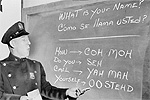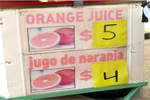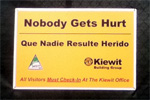There is no easy way to start learning a foreign
language. At some point you just need to dive-in and not be embarrassed when you
say the wrong thing or can’t understand what someone else tells you. (Think of
all the babbling you did as a baby before you could string together enough words
to form complete sentences.)
Click on a category below to see some common
words and expressions that you can use to get started on the long, awkward process
of learning Spanish.
[ expand all | collapse all ]
There are exceptions of course, but as a general rule,
Spanish-speaking people tend to be very warm, patient, and understanding. They
love it when you attempt to speak their language, and even if you butcher it,
don’t worry; they also have great senses of humor. These are some phrases you
can use to get to know people.

| ¡Hola! |
Hi! / Hello! |

| ¡Bienvenidos! |
Welcome! |

| ¡Buenos Días! |
Good morning! |

| ¡Buenas Tardes! |
Good afternoon! |

| ¡Buenas Noches! |
Good evening! |

| Me llamo… |
My name is… |

| ¿Cómo se llama usted? |
What is your name? (polite) |

| ¿Cómo te llamas? |
What is your name? (informal) |

| Mucho gusto. / Encantado. |
It’s nice to meet you. |

| ¿Qué pasa? |
What’s happening? |

| ¿Qué tal? |
What’s up? |

| ¿Cómo le va? |
How’s it going? (polite) |

| ¿Cómo te va? |
How’s it going? (informal) |

| ¿Cómo está usted? |
How are you? (polite) |

| ¿Cómo estás? |
How are you? (informal) |

| Estoy bien. |
I’m doing well. |

| Estoy más o menos. |
I’m OK. |

| Estoy así así. |
I’m so so. |

| Estoy mal. |
I’m not doing well. |

| Estoy muy mal. |
I’m not at all well. |

| ¿Y usted? |
And you? (polite) |

| ¿Y tú? |
And you? (informal) |

| ¿Cómo? |
What? |

| Repita por favor. |
Could you repeat that? |

| ¿De dónde es usted? |
Where are you from? (polite) |

| ¿De dónde eres? |
Where are you from? (informal) |

| Soy de… |
I’m from … |

| ¿Cuántos años tiene usted? |
How old are you? (polite) |

| ¿Cuántos años tienes? |
How old are you? (informal) |

| Yo tengo … años. |
I am … years old. |

| Lo siento. |
I’m sorry. |

| No entiendo. |
I don’t understand. |

| No sé. |
I don’t know. |

| Hasta luego. / Hasta la vista. |
See you later. |

| Hasta pronto. |
See you soon. |

| Hasta mañana. |
See you tomorrow. |

| Por favor. |
Please. |

| Gracias. |
Thanks. |

| De nada. |
You’re welcome. |

| Con permiso. |
If you’ll excuse me. |
The following words and phrases will help you plan out
events in the future as well as better understand what happened (and when) in
the past. When planning future events with Spanish-speakers you should be aware
that most latinos have very cavalier attitudes towards time and deadlines. People
may start arriving at 7:30 or even 8:00 for 7:00 meetings. Unlike English, days
of the week and months of the year are not capitalized.

| El día |
Day |

| La mañana |
Morning |

| La tarde |
Afternoon |

| La noche |
Evening / Night |

| Ayer |
Yesterday |

| Hoy |
Today |

| Mañana |
Tomorrow |

| ¿En qué día? |
On what day? |

| En el domingo. |
On Sunday. |

| El lunes |
Monday |

| El martes |
Tuesday |

| El miércoles |
Wednesday |

| El jueves |
Thursday |

| El viernes |
Friday |

| El sábado |
Saturday |

| La semana |
Week |

| El fin de semana |
Weekend |

| La fecha |
The date |

| ¿Cuál es la fecha de hoy? |
What is the date today? |

| Es el 24 de enero. |
It’s January 24. |

| Es el primero de febrero. |
It’s the first of February. |

| El marzo |
March. |

| El abril |
April |

| El mayo |
May |

| El junio |
June |

| El julio |
July |

| El agosto |
August |

| El septiembre |
September |

| El octubre |
October |

| El noviembre |
November |

| El diciembre |
December |

| El mes |
Month |

| En unos meses. |
In a few months. |

| El año |
Year |

| Hace tres años. |
Three years ago. |

| ¿Qué hora es? |
What time is it? |

| Es la una. |
It’s one o’clock. |

| Son las dos. |
It’s two o’clock. |

| Son las tres y cuarto. |
It’s three fifteen. |

| Son las tres y quince. |
It’s three fifteen. |

| Son las cuatro y media. |
It’s four thirty. |

| Son las cinco cuarenta y cinco. |
It’s five forty-five. |

| Son las seis menos cuarto. |
It’s five forty-five. |

| Son cuarto para las siete. |
It’s six forty-five. |

| Son diez para las ocho. |
It’s seven fifty. |

| Es mediodía. |
It’s noon. |

| Es medianoche. |
It’s midnight. |

| ¿Cuándo? |
When? |

| ¿A qué hora…? |
What time…? |

| A la una. |
At one o’clock. |

| A las dos. |
At two o’clock. |
Some popular Hispanic tourist destinations can be so thoroughly
Americanized that you scarcely noticed you’ve left the U.S. But there are other
less well-known places just off the beaten path where knowing a little bit of
Spanish can make your travels much more rewarding. Regardless of where you’re
headed, here are some helpful travel words and expressions.

| El baño / Los servicios |
Bathroom |

| El aeropuerto |
Airport |

| El avión |
Airplane |

| El vuelo |
Flight |

| La puerta |
Gate |

| Las salidas |
Departures |

| Las llegadas |
Arrivals |

| ¿Cuándo sale…? |
When does … depart? |

| ¿Cuándo llega…? |
When does … arrive? |

| La aduana |
Customs |

| El pasaporte |
Passport |

| El puerto |
Port |

| El barco |
Ship |

| La estación de trenes |
Train station |

| La parada de autobuses |
Bus stop |

| El taxi |
Taxi |

| El coche / El carro |
Car |

| El mapa |
Map |

| El hotel |
Hotel |

| La habitación |
Room |

| La habitación individual |
Single room |

| La habitación doble |
Double room |

| El restaurante |
Restaurant |

| La playa |
Beach |

| La cancha de golf |
Golf course |

| La piscina |
Pool |
A language barrier can leave men with yet another reason
not to stop and ask for directions, but if you’re really in a bind, the following
expressions might be helpful. You’ll realize of course once you’ve asked someone
a question, you may have no idea what they tell you, but if nothing else you can
always just head in the direction they pointed.

| Señor… / Señora… / Señorita… |
Sir… / Ma’am… / Miss… |

| Perdóneme… |
Pardon me… |

| ¿Podría ayudarme…? |
Could you help me…? |

| ¿Podría decirme…? |
Could you tell me…? |

| ¿Podría indicarnos…? |
Could you show us…? |

| ¿Dónde está…? |
Where is…? |

| ¿Dónde están…? |
Where are…? |

| ¿Sabe Usted dónde está…? |
Do you know where … is? |

| ¿Sabe Usted dónde están…? |
Do you know where … are? |

| Está por… / Está cerca de… |
It’s around… / It’s near… |

| Está cerca. |
It’s nearby. |

| Está lejos. |
It’s far away. |

| Aquí |
Here |

| Allí |
There |

| Entre |
Between |

| Hacia |
Towards |

| Delante de |
In front of |

| Debajo de |
Beneath, below |

| En frente de |
Across from, opposite |

| Al lado de |
Next to |

| Detrás de |
Behind |

| A la derecha |
To the right |

| A la izquierda |
To the left |

| Recto / Derecho |
Straight |

| Unas … cuadras. |
About … blocks. |

| La milla |
Mile |

| El kilómetro |
Kilometer |

| Al norte. |
To the North. |

| Al este. |
To the East. |

| Al sur. |
To the South. |

| Al oeste. |
To the West. |

| La calle |
Street |

| La avenida |
Avenue |

| La carretera / La autopista |
Highway |
Once you’ve gotten to where you’re going, you’re probably going to
want to do what every American tourist does: shop and eat. Many shopkeepers outside
of the U.S. are practiced at dealing with foreign travelers. You may be surprised
at how far English (and U.S. dollars) will get you. But you’ll be much better
off (and get much better prices) when you at least try speaking your host’s language.
This would also be a good time to brush up on your numbers
and the local exchange rate. By the way, Hispanic waiters typically will not bring
you the bill in a restaurant until you ask for it.

| ¿Cuánto es? |
How much is it? |

| ¿Cuántos son? |
How much are they? |

| ¿Cuánto cuesta? |
What does it cost? |

| ¿Cuánto cuestan? |
What do they cost? |

| ¡Qué va! |
You’ve got to be joking! |

| Barato |
Inexpensive |

| Caro |
Expensive |

| ¿De qué es? |
What’s it made of? |

| ¿De qué son? |
What are they made of? |

| ¿Acepta dólares? |
Do you accept (U.S.) dollars? |

| Su cambio es… |
Your change is… |

| ¿Cuál es la tasa de cambio? |
What is the exchange rate? |

| ¿Podría ver el menú? |
Could I see the menu? |

| Las bebidas / Los refrescos |
Drinks |

| El agua |
Water |

| La leche |
Milk |

| La cerveza |
Beer |

| El vino |
Wine |

| La taza |
Cup |

| El café |
Coffee |

| Las entradas / Los antojitos |
Appetizers |

| El plato típico |
Local / regional dish |

| La ensalada |
Salad |

| Los huevos |
Eggs |

| La carne |
Meat |

| El bistec |
Steak |

| El pollo |
Chicken |

| Los mariscos |
Seafood |

| La longosta |
Lobster |

| Los camarones |
Shrimp |

| El pan |
Bread |

| El arroz |
Rice |

| Los frijoles |
Beans |

| Los postres |
Desserts |

| El desayuno |
Breakfast |

| El almuerzo |
Lunch |

| La merienda |
Snack |

| La cena |
Dinner |

| Quisiera tener… |
I would like to have… |

| Quisiera pedir… |
I would like to order… |

| La cuenta por favor. |
The bill please. |

| La propina |
Tip |
We all hope to stay safe, well, and healthy on our travels,
but just in case it's not a bad idea to have some of these words and phrases ready
to go.

| ¡Ayuda! / ¡Auxilio! |
Help! |

| Estoy enfermo. |
I’m sick. (if you are a male) |

| Estoy enferma. |
I’m sick. (if you are a female) |

| Me siento mal. |
I don’t feel well. |

| Necesito… |
I need… |

| La policía |
Police |

| ¡Me han robado! |
I’ve been robbed! |

| Los bomberos |
Firefighters |

| ¡Fuego! / ¡Incendio! |
Fire! |

| El doctor / El médico |
Doctor |

| El hospital |
Hospital |

| La ambulancia |
Ambulance |

| Me duele… |
My … hurts. |

| Tengo dolor de… |
I have a pain in … |

| La cabeza |
Head |

| El brazo |
Arm |

| La mano |
Hand |

| La pierna |
Leg |

| El pie |
Foot |

| Soy alérgico a… |
I’m allergic to… (if you are a male) |

| Soy alérgica a… |
I’m allergic to… (if you are a female) |

| Soy diabético. |
I’m diabetic. (if you are a male) |

| Soy diabética. |
I’m diabetic. (if you are a female) |

| Tengo diarrea. |
I have diarrhea. |
As if all the years of medical school weren’t enough work,
medical personnel are increasingly finding that to provide effective health care,
it’s important to know a little Spanish. When a translator isn’t available, knowing
a handful of these words can be very helpful.

| ¿Dónde te duele? |
Where does it hurt? |

| La sangre |
Blood |

| El hueso |
Bone |

| El hueso roto |
Broken Bone |

| Los pulmones |
Lungs |

| La respiración |
Breathing |

| La tos |
Cough |

| El corazón |
Heart |

| El infarto |
Heart attack |

| Los ojos |
Eyes |

| Los oídos |
Ears |

| La nariz |
Nose |

| La boca |
Mouth |

| La garganta |
Throat |

| El estómago |
Stomach |

| El dolor |
Pain |

| La fiebre |
Fever |

| La inflamación |
Swelling |

| Los síntomas |
Symptoms |

| La enfermera |
Nurse |

| El doctor / El médico |
Doctor |

| La examinación |
Examination |

| La prueba |
Test |

| La inyección |
Shot |

| Las pastillas / Las píldoras |
Pills |

| La receta |
Prescription |

| La radiografía |
X-Ray |

| El yeso |
Cast |

| La medicina |
Medicine |

| La cirugía |
Surgery |

| El hospital |
Hospital |

| El dentista |
Dentist |

| Los dientes |
Teeth |

| Necesitamos… |
We need to… |

| Necesito… |
I need to… |

| Necesitas… |
You need to… |
On many construction sites
Spanish is an important (if not the dominant) language. The following words and
phrases can help Spanish-speakers and English-speakers understand each other.
Be aware, however, that just like in English, there are many slang terms and regional
dialects to deal with (especially with tools). And you might be surprised to see
that Hispanic workers might just understand you better in English than when you
try out your Spanish.

| ¡Cuidado! |
Careful! |

| ¡Ojo! |
Heads up! / Look out! |

| Las botas |
Boots |

| Los guantes |
Gloves |

| El casco |
Hard hat |

| La cerca |
Fence |

| El muro |
Wall (outdoor) |

| La pared |
Wall (of a building) |

| ¿Cómo se llama? |
What’s it called? |

| La pala |
Shovel |

| El martillo |
Hammer |

| El clavo |
Nail |

| El dril |
Drill |

| El destornillador |
Screwdriver |

| El tornillo |
Screw |

| La llave |
Wrench |

| El perno |
Bolt |

| La tuerca |
Nut |

| La serrucha |
Saw |

| Los alicates / Las pinzas |
Pliers |

| El balde |
Bucket |

| La pulgada |
Inch |

| El pie |
Foot |

| La yarda |
Yard |

| El carrillo |
Wheelbarrow |

| El camión / El truque |
Truck |

| La zanja |
Trench |

| El hoyo |
Hole |

| La tierra |
Dirt |

| El cemento |
Cement |

| La madera |
Wood |

| Los ladrillos |
Bricks |

| El metal |
Metal |

| El alambre |
Wire |

| La pintura |
Paint |

| La electricidad |
Electricity |

| La escoba |
Broom |

| La basura |
Trash |

| El basurero |
Trash container |

| Limpia… |
Clean… |

| Trae… |
Bring… |

| Lleva… |
Carry… |

| Excava… |
Dig… |

| Pon… |
Put… |

| Carga… |
Load… |

| Descarga… |
Unload… |

| Enciende… |
Turn on… |

| Apaga… |
Turn off… |





 This work by Spanish411.net is licensed under a Creative Commons Attribution-NonCommercial-ShareAlike 4.0 International License.
This work by Spanish411.net is licensed under a Creative Commons Attribution-NonCommercial-ShareAlike 4.0 International License.